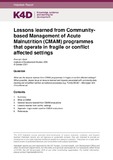Lessons Learned from Community-based Management of Acute Malnutrition (CMAM) Programmes that Operate in Fragile or Conflict Affected Settings
Abstract
This rapid review synthesises the literature on how community-based management of acute malnutrition (CMAM) programmes could be adapted in settings of conflict and fragility. It identifies multiple factors affecting the quality and effectiveness of CMAM services including the health system, community engagement and linkages with other programmes, including education, sanitation, and early childhood development.
Family MUAC (Mid-Upper Arm Circumference) is a useful tool to increase community participation and detect early cases of moderate acute malnutrition (MAM) and severe acute malnutrition (SAM) more effectively and less likely to require inpatient care.
The literature does not say a lot about m-Health solutions (using mobile devises and applications) in data collection and surveillance systems. Many of the above-mentioned issues are relevant for CMAM programmes in settings of non-emergency, emergency, conflict and fragility. However, there are special circumstance in conflict and fragile settings that need adaptation and simplification of the standard protocols.
Because of a broken or partly broken health system in settings of conflict and fragility, local governments are not able to fund access to adequate inpatient and outpatient treatment centres. NGOs and humanitarian agencies are often able to set up stand-alone outpatient therapeutic programmes or mobile centres in the most affected regions.
The training of community health volunteers (CHVs) is important and implementing Family MUAC.
Importantly, research shows that:
Low literacy of CHVs is not a problem to achieve good nutritional outcomes as long as protocols are simplified.
Combined/simplified protocols are not inferior to standard protocols. However, due to complexities and low funding, treatment is focused on SAM and availability for children with MAM is far less prioritised, until they deteriorate to SAM.
There is widespread confusion about combined/simplified protocol terminology and content, because there is no coherence at the global level.
Citation
Quak, E. (2021). Lessons learned from Community-based Management of Acute Malnutrition (CMAM) programmes that operate in fragile and conflict affected settings. K4D Helpdesk Report no.1048. Brighton, UK: Institute of Development Studies, DOI:10.19088/K4D.2021.133DOI
10.19088/K4D.2021.133Is part of series
K4D Helpdesk Report;1048Rights holder
© Crown copyright 2021Sponsor
FCDO (Foreign, Commonwealth and Development Office)Collections
- K4D [937]

